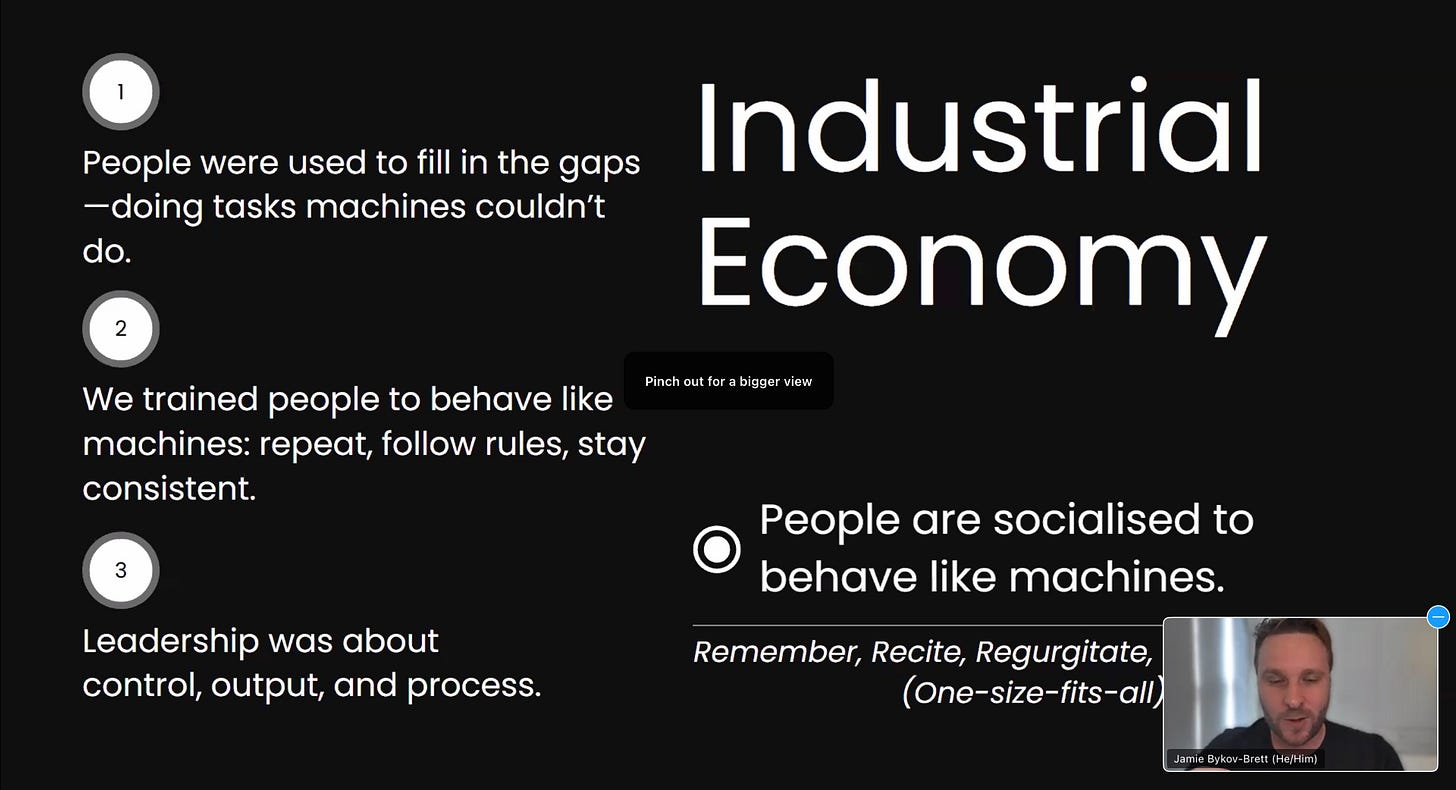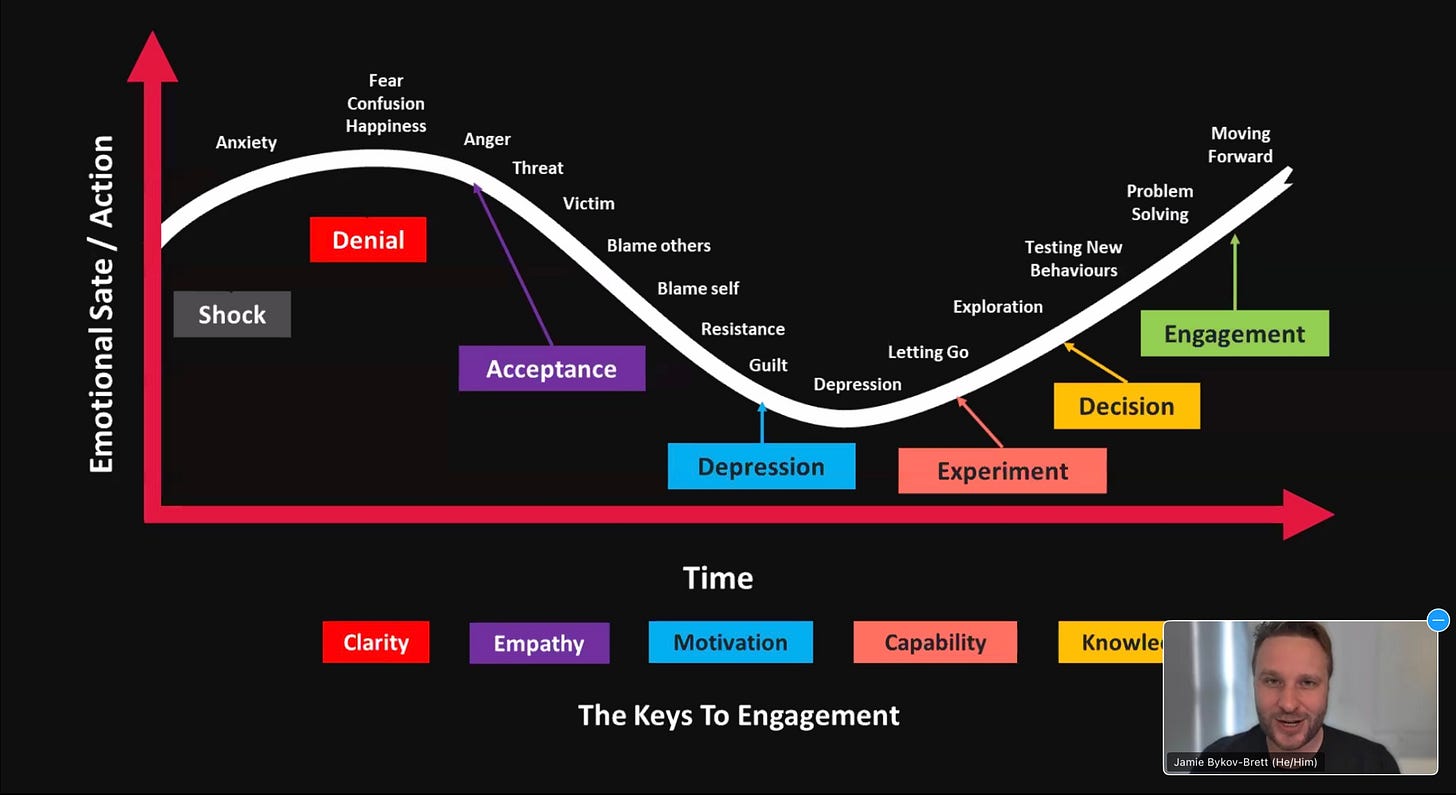In a change to usual service, I recently attended a really thought-provoking webinar led by Jamie Bykov-Brett from the Executive AI Institute hosted by The Corporate Governance Institute. It was the engaging, thoughtful and practical in equal message and really made me stop in my tracks on AI so I thought it was worth sharing my reflections.
It offered a fresh perspective on leadership in the age of AI, and why this is much more than a technology conversation. What caught me right away were the moral and ethical questions Jamie raised at the very start, questions we don’t often hear discussed openly.
Moral Questions We Need to Ask About AI
If you’re sacked and your employer creates a ‘cognitive copy’ of you to do your job, is that ok? If they pay you a salary for the services of the ‘cognitive copy’, is that ok? If that ‘cognitive copy’ wins an award and you take the credit, is that ok? If that ‘cognitive copy’ commits a crime, do you take the blame?
These are big, uncomfortable questions, but they are essential if we want to understand what it means to be human and responsible in a world shaped by AI.
IBM Slide from 1979
From the Industrial Revolution to the Digital Economy
Jamie framed AI transformation as a huge human and leadership challenge, comparing it to the Industrial Revolution. Back then, organisations trained people to behave like machines: following rules, repeating tasks, fitting into strict hierarchies. Leadership focused on control, output, and process.
Now we live in the digital economy, where human value is in the things machines cannot do: creativity, emotion, adaptability, and collaboration. Leadership styles must evolve to embrace this shift or risk being out of step with the new world.
AI Adoption Is About Change and Transition
AI adoption is not just about technology. It is a deep change management challenge that tests our ability to support people through profound transitions.
Research shows that 92% of change initiatives fail to deliver their promised results. Often this happens because leaders move faster than their teams, which creates resistance and fatigue. Jamie explained that many organisations invest in training and culture change at the start, but then pull back when they see early signs of success. In reality, the hard work needs to continue through the whole process.
Why Communication and Empathy Matter
Poor communication is a huge risk in AI transformations. When people do not understand why AI is being introduced or how it will affect their work, fear and mistrust grow. These feelings tap into our deepest human needs, safety, autonomy, connection, and purpose, all threatened by the idea of machines taking over.
Jamie also pointed out that digital interactions are replacing some traditional community connections. For some, AI companionship is even emerging outside of content creation. This shows how we need to rethink what it means to be human and connected in the age of AI.
The Difference Between Change and Transition
One of the most useful insights Jamie shared was the difference between change and transition. Change is the event, such as launching an AI project or updating a system. Transition is the internal psychological process people go through to let go of the old and embrace the new.
Many people get stuck in this transition. Reflecting on the change curve, right now, many organisations are in “depression valley,” where they accept AI is coming but feel unsure about what comes next.
Leaders who understand and support people through this emotional journey will be far more successful.
Ethical Leadership in AI
Jamie also stressed the importance of ethical frameworks and accountability. AI can perpetuate societal biases and cause harm if left unchecked. We need policies, oversight, and ongoing awareness to ensure AI produces socially acceptable outcomes. The question of who is responsible when AI acts is critical and must be part of leadership conversations.
Focusing on Human Strengths
Finally, the webinar reminded me that our focus should remain on uniquely human skills: critical thinking, creativity, communication, collaboration, and curiosity. AI is powerful, but it cannot replace what makes us human.
What This Means for Leaders
If there is one key lesson, it is that successful AI leadership is about more than understanding technology. It is about leading people through emotional and cultural transitions. It is about investing in learning, communicating openly, and centering the human experience in every decision.
We are entering a new economy where machines can do more than ever before. But there will always be a vital role for human creativity, empathy, and adaptability.
It was a great session that really made me think differently about my role in leadership within emerging technology and AI. It gave me lots of food for thought, and I hope that sharing these notes will be useful to others navigating similar challenges.








Brilliant read Emma, and chimes very much with a debate we had in one of our work forums recently! Will share with my team, I think there are some really good points to discuss here x
I'm obviously unfairly biased, but I really enjoyed this read, Emma. :)